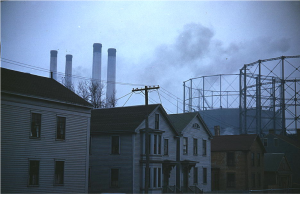Michael B. Kent, Jr.*
Introduction
The expanded use of horizontal drilling and hydraulic fracturing (“fracking”) has raised significant concerns about the environmental impacts of the process. Incidents of methane leaks, water contamination, and air pollution are among the most frequently-raised issues.[1] But fracking has other potential impacts, as well—specifically, impacts on the character of local communities. As one scholar has noted, fracking is, from start to finish, an industrial process, with the same potentially disruptive effects that flow from other industrial land uses.[2] “In many cases,” as another commenter notes, “communities are encountering large-scale industrial fossil fuel production for the first time, and as remote natural gas resources are exhausted, fracking continues to push closer to residential areas.”[3] In several states, these circumstances have created tension between state laws regulating oil and gas exploration, on the one hand, and local land use ordinances seeking to restrict fracking-related activities, on the other. The policy debate concerns what level of government should regulate fracking; the legal debate concerns whether state fracking legislation preempts local land use authority. Courts considering the issue to date have tended to side with local governments, invalidating state-level attempts to wrest control over fracking from local communities.
In the summer of 2014, North Carolina entered this debate when the General Assembly enacted fracking legislation that expressly preempts local ordinances prohibiting, or having the effect of prohibiting, oil and gas development.[4] This Essay considers whether North Carolina’s preemption provision is likely to pass judicial scrutiny or suffer the fate of similar legislation in other states. After reviewing the reasoning employed by other courts, as well as the mechanics of the North Carolina preemption provision, my preliminary conclusion is that North Carolina’s fracking legislation will likely have more success when facing judicial scrutiny than similar legislation has received elsewhere.
Marcellus Shale Litigation
The legal tension between state and local power over fracking has been highlighted by recent litigation flowing out of the states that contain the Marcellus Shale formation, where fracking activities have been in full swing.[5] Two decisions—one from the New York Court of Appeals and the other from the Pennsylvania Supreme Court—highlight the legal issues.
1. Wallach v. Town of Dryden[6]
Two New York municipalities enacted local zoning ordinances that prohibited oil and gas operations within their respective jurisdictions.[7] Oil and gas lessees in both towns sued, arguing that the ordinances were preempted by a state statute, which provided that it “shall supersede all local laws or ordinances relating to the regulation of the oil, gas, and solution mining industries.”[8] In a consolidated appeal, a majority of the New York Court of Appeals disagreed.[9]
Noting that New York is a home rule state, and that zoning is one of the “core powers of local governance,”[10] the majority stated that it would find preemption only where there was clear legislative intent to specifically preempt local land use authority.[11] The majority then reviewed the language of the state statute, as well as the overall statutory scheme and legislative history, and concluded that no such intent existed.[12] The statutory language preempting local laws “relating to the regulation of the oil, gas, and solution mining industries,” did not include these zoning laws, which were “[p]lainly . . . directed at regulating land use generally [rather than] the details, procedures or operations of the oil and gas industries.”[13] In short, because the land use ordinances did not directly regulate oil and gas operations, they were not preempted, despite their indirect effect on such operations.
2. Robinson Township v. Commonwealth[14]
In a case that spawned four separate opinions covering more than 100 pages in the Reporter, a divided Pennsylvania Supreme Court held that local autonomy trumped a state statute regulating oil and gas development.[15] Among other things, the statute at issue (known as “Act 13”) amended the state’s oil and gas laws to: (1) provide for a single, statewide zoning regime for oil and gas development activities;[16] and (2) preempt local ordinances purporting to regulate oil and gas operations in a manner different than that established by the statewide scheme.[17] Several municipalities and municipal officials filed suit to challenge Act 13 on the grounds that it violated several provisions of the Pennsylvania and United States Constitutions.[18]
In the state supreme court, a three-member plurality viewed Act 13 as violating article I, section 27 of the Pennsylvania Constitution.[19] That provision—the so-called “Environmental Rights Amendment”—bestows “a right to clean air, pure water, and to the preservation of the natural scenic, historic and esthetic values of the environment” and says that “the Commonwealth shall conserve and maintain [the state’s natural resources] for the benefit of all people.”[20] According to the plurality, this provision of the state constitution obliges each branch of government—at both the state and local levels—to consider in advance the environmental effect of any proposed action it might take.[21] Moreover, because local governments are obligated in the same manner as the state, the state legislature had no power to take from them the necessary means by which they might fulfill that obligation (here, the power to regulate land uses).[22] Finally, the plurality concluded that the protection of environmental values was a quintessentially local issue “that must be tailored to local conditions.”[23] For all of these reasons, Act 13’s uniform, statewide zoning regime was held unconstitutional.[24]
North Carolina’s Fracking Legislation
The experience of litigation in the Marcellus Shale demonstrates that state statutes purporting to preempt local land use regulations have not been met with judicial favor. Because North Carolina’s recent fracking statute contains a preemption provision, the question is whether this judicial disfavor will repeat itself and threaten the scheme worked out by the state’s General Assembly to balance the tension between state and local legislation. To help answer this question, the following is a discussion of the North Carolina preemption provision and a brief analysis of how North Carolina’s law differs from that in New York and Pennsylvania.
1. The Preemption Provision
North Carolina General Statute § 113-415.1 explicitly states that the General Assembly intends “to maintain a uniform system” relating to oil and gas operations and that “any local ordinance that prohibits or has the effect of prohibiting oil and gas exploration, development, and production activities . . . shall be invalidated to the extent necessary to effectuate the purposes of [the fracking statute].”[25] The scope of the provision specifically includes local laws “regulating land use,” as well as “horizontal drilling or hydraulic fracturing.”[26] There is a catch, however; the statute only invalidates local laws “that the Mining and Energy Commission has preempted pursuant to this section.”[27]
The statute then provides a process for obtaining a preemption decision from the Commission. Whenever a local ordinance would prevent its operations, the oil and gas operator may petition the Commission to review the ordinance.[28] Upon receipt of such a petition, the Commission must hold a public hearing in the affected locality within sixty days, after which it must decide whether and to what extent the ordinance should be preempted.[29] To the extent that the local ordinance imposes generally applicable restrictions, it is presumed to be valid unless the Commission makes a factual finding to the contrary.[30] Moreover, the Commission may only preempt a local ordinance if it makes all of the following findings:
(1) That there is a local ordinance that would prohibit or have the effect of prohibiting oil and gas exploration, development, and production activities, or the use of horizontal drilling or hydraulic fracturing for that purpose.
(2) That all legally required State and federal permits or approvals have been satisfied and that the permits or approvals have been denied or withheld only because of the local ordinance.
(3) That local citizens and elected officials have had adequate opportunity to participate in the permitting process.
(4) That the oil and gas exploration, development, and production activities, and use of horizontal drilling or hydraulic fracturing for that purpose, will not pose an unreasonable health or environmental risk to the surrounding locality and the operator has taken or consented to take reasonable measures to avoid or manage foreseeable risks . . . .[31]
2. Preliminary Analysis
Although nothing is certain, there are several reasons to think that the preemption provision of the North Carolina fracking statute will have more judicial success than those in New York and Pennsylvania. First, whereas New York is a home rule jurisdiction, North Carolina is not. Technically, municipalities in North Carolina “can exercise only that power which the legislature has conferred upon them.”[32] Although the General Assembly has indicated that powers granted to local governments should be construed broadly,[33] the courts have not always followed this directive. According to a recent decision of the North Carolina Court of Appeals, local powers are to be construed broadly only where there is an ambiguity in the authorizing statute; otherwise, the plain meaning of the statute “must be enforced as written.”[34] Additionally, the courts have held that local power is necessarily limited when exercised in a manner that is inconsistent with state law.[35] Such an inconsistency exists when the local ordinance purports to regulate a subject that municipalities are expressly forbidden to regulate by state statute, or purports to regulate a field for which the state statute demonstrates an intent to provide a uniform scheme.[36] Because the fracking statute expresses an intent to create a uniform system relating to oil and gas operations, as well as expressly invalidates local ordinances preempted by the Mining and Energy Commission,[37] it probably would be deemed sufficient to overcome any local zoning authority that otherwise might exist. Accordingly, the reasoning employed by the New York court in Wallach—which relied heavily on local home rule authority and past precedent indicating that attempts to overcome such authority should be construed narrowly—is unlikely to find much traction given North Carolina’s differing laws on local power.[38]
The reasoning of the Pennsylvania court in Robinson Township seems unlikely to fare much better. Although the North Carolina Constitution contains a provision relating to natural resources, it is nowhere near as robust as the language contained in the Pennsylvania Constitution. The North Carolina provision states that “it shall be a proper function of the State . . . and its political subdivisions . . . to control and limit the pollution of our air and water . . . .”[39] Although this language might possibly be used to impose an obligation similar to that in Robinson Township, the North Carolina language (i.e., “proper function”)[40] is much weaker in this regard than that of the Pennsylvania Constitution (i.e., “shall conserve and maintain”).[41] Moreover, research has revealed no North Carolina judicial decision interpreting the provision that broadly. Finally, unlike the statewide zoning regime in Robinson Township, the North Carolina fracking legislation—which seeks to preserve generally applicable zoning ordinances and allows preemption only if the fracking operations do not pose unreasonable risks to the locality[42]—leaves plenty of room for local considerations and local tailoring.
Conclusion
One of the predominant legal issues with the recent spate of fracking in the United States is whether state statutes pertaining to fracking operations preempt local ordinances relating to land use. While the case law demonstrates some judicial disfavor with the preemption argument, the North Carolina fracking legislation (along with North Carolina local government and constitutional law) differs substantially from that of other states where the issue has been tested. Although there are no certainties, a preliminary review suggests that the preemption provision of North Carolina’s fracking statute will fare better than those challenged in other jurisdictions.
* Associate Professor of Law, Campbell University School of Law.
[1]. See Jason Schumacher & Jennifer Morrissey, The Legal Landscape of “Fracking”: The Oil and Gas Industry’s Game-Changing Technique Is Its Biggest Hurdle, 17 Tex. Rev. L. & Pol. 239, 243–51 (2013) (discussing potential water and air quality issues).
[2]. David B. Spence, Federalism, Regulatory Lags, and the Political Economy of Energy Production, 161 U. Pa. L. Rev. 431, 480–81 (2013) (noting aesthetic, noise, and social issues in addition to air and water quality).
[3]. Rachel A. Kitze, Note, Moving Past Preemption: Enhancing the Power of Local Governments Over Hydraulic Fracturing, 98 Minn. L. Rev. 385, 389–90 (2013).
[4]. See generally Act of June 4, 2014, 2014 N.C. Sess. Law 2014-4 (providing for development of oil and gas exploration) (effective, with some exceptions, June 4, 2014).
[5]. Schumacher & Morrissey, supra note 1, at 303.
[6]. 23 N.Y.3d 728 (N.Y. 2014).
[8]. See N.Y. Envtl. Conserv. Law § 23-0303(2) (McKinney 2014).
[9]. Wallach, 23 N.Y.3d at 739.
[16]. See 58 Pa. Cons. Stat. § 3304.
[18]. Robinson Twp., 83 A.3d at 915–16.
[20]. Pa. Const. art. I, § 27.
[21]. Robinson Twp., 83 A.3d at 952.
[24]. Id. at 978, 981–82. A fourth member of the court concurred in the result, but on different grounds. Specifically, the concurrence found that Act 13 violated substantive due process by imposing zoning standards that bore no rational basis to local realities. See id. at 1000–09 (Baer, J., concurring).
[25]. N.C. Gen. Stat. § 113-415.1(a) (2014).
[31]. Id. The Commission’s decision is reviewable under the state Administrative Procedure Act upon the filing of a petition within thirty days of the date of the decision. See id. § 113-415.1(h).
[32]. Bowers v. City of High Point, 451 S.E.2d 284, 287 (N.C. 1994).
[33]. See N.C. Gen. Stat. § 160A-4 (2000).
[34]. King v. Town of Chapel Hill, 743 S.E.2d 666, 672 (N.C. Ct. App. 2013), aff’d in part, rev’d in part on other grounds, 758 S.E.2d 364 (N.C. 2014).
[35]. See, e.g., Craig v. Cnty. of Chatham, 565 S.E.2d 172, 175 (N.C. 2002).
[36]. N.C. Gen. Stat. §§ 160A-174(b)(4)–(5) (2000).
[37]. N.C. Gen. Stat. § 113-415.1(a) (2014).
[38]. See generally Wallach v. Town of Dryden, 16 N.E.2d 1188 (N.Y. 2014).
[39]. N.C. Const. art. XIV, § 5.
[41]. PA. Const. art. I, § 27.
[42]. N.C. Gen. Stat. §§ 113-415.1(a), (f) (2014).
PDF version of North Carolina’s “Fracking” Legislation by Michael B. Kent, Jr.



